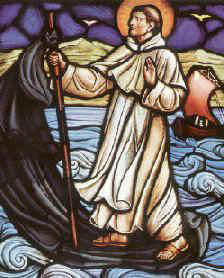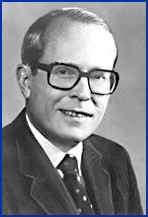|
To work for the proper implementation of canon law is to play an extraordinarily constructive role in continuing the redemptive mission of Christ. Pope John Paul II |
|
|
|
|
Resolution 1152 x 864 |
Updated 10 jan 2013 |
Review of William Rusher, The Rise of the Right (1984) = pp. |
|
Edward Peters, Review of W. Rusher, The Rise of the Right (1984), in Reflections (Summer 1984) 13.
Rusher |
I do not think it an exaggeration to say that, without William Rusher, the conservative revival in America would not have taken place. At the very least, three people would be required to take his place – one to publish National Review, one to advise and assist Young Americans for Freedom, and one to act as a clearinghouse for information on a vast panoply of political developments over the last three decades. This is not, of course, to suggest that Rusher single-handedly led America back to a more stable domestic and international position, but rather that his contribution to this great effort was vital to its success.
Now, with a full life of active participation, thoughtful reflection, and consummate writing experience behind him, William Rusher has stepped aside to record his personal memoirs. Not that he has withdrawn from the fray, but like a gentleman and scholar, he has seen the importance of leaving his learning for those who will pick up the sword in his place. It is with every right that he has titled his work The Rite of the Right, for Rusher’s life is an closely bound to American conservative thought as the conservative political movement is indebted to William Rusher.
Rusher did not set out to write a definitive history of conservatism in the United States, nor even of its purely political manifestations. The former task, I believe, has been fulfilled by George Nash in The Conservative Intellectual Movement in America (to which Rusher frequently alludes in his own work), while the latter of necessity must wait for many more years. But in presenting his own involvement with this movement, Rusher has written an amazingly informative account of the return to right thought.
If any subject may be said to stand out particularly well in this work, I think it would be Rusher’s account of the last half-dozen Republican conventions. He records with special skill (namely, the skill and insight of one who was there) how personalities, emotions, traditions, and pure chance all come together to influence and direct the plans laid over months and years – and influence them not always for the better. Reading these sections leaves one with a much clearer appreciation of Rusher’s long-standing support for a third party. One wonders, too, if Rusher’s pointed criticisms of political institutional sloth might not contain within it a more determined exhortation to individual social and political efforts. As James Hitchcock has observed, pluralism does not mean that we are to refrain from pushing our beliefs. It means that we, beginning as individuals, must fight for those beliefs, because if we do not, we are going to lose.
Rusher made it clear to then President-elect Reagan that, due to the time required to write this book, he would not be available to play an active role in the new administration. Presumably, this task also cut down on his availability for other projects. In any event, the two years devoted to the work were well spent indeed. But the book has been written now, and America is on the verge of determining her path for the next four years. The troops, Mr. Rusher, need battle-tested leaders.
|





